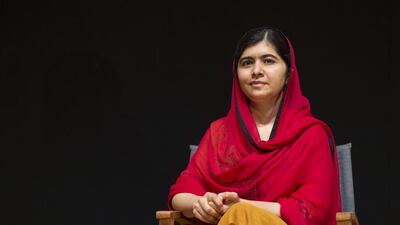Malala Yousafzai was at Emirates Palace last week along with her father, Ziauddin Yousafzai, for a private screening of her documentary, He Named Me Malala, co-produced by Abu Dhabi's Image Nation. In an exclusive interview with The National, the 18-year-old Nobel Peace Prize laureate talks about her commitment to making education accessible to children all over the world, the UAE's efforts to support her cause, and her thoughts on becoming prime minister of Pakistan, her home country.
With your documentary finally released, does it feel like you can now close the chapter on that part of your life?
a The documentary is done now, but the next part of this documentary is to spread it across the world and make sure the people watch it and learn from the story of our family. Our story is similar to many other people who have suffered through war and terrorism, but it also gives the message that you should raise up your voice and try to bring change in your society.
How was your experience watching the film for the first time with your family?
It was great to see the film together with the family. What was really inspiring was the animation that was included in the film, which told our story in a very powerful way. I looked back at the past.
How does the film differ from the book?
The documentary is really about our personal feelings, how we felt as a family during the terrorism situation in Swat Valley. The film does not go into details about politics and what is happening. But the book delves deep into the politics and history and background of Swat Valley, of Pakistan, of everything. It offers a lot of information so people can know more about our story. The film is more focused on our feelings and how we felt at that time.
Has it been hard to get past the horrific attempt on your life in 2012?
Well, right from the beginning I just did not associate myself with being a girl who was shot at. I decided that I want to be someone different, even though I have been shot and this has happened in my life, but now it’s time that I become the voice of girls around the world not just in Pakistan, not just in Swat Valley, but the world. And the definition of who I am has changed from a schoolgirl who was shot at by the Taliban to someone who raises her voice for her rights and education. This is what I have been doing in the past years – going to Nigeria, speaking of the girls who were abducted by Boko Haram, or acting on behalf of girls in Syria, in Jordan, in Lebanon, who are now refugees. This has been my mission.
The UAE has been a big supporter of your efforts. How much does that support mean to you?
The UAE has provided a lot of support in terms of campaigning for the film and education. We are really grateful for all their support to help us to make sure we succeed in our mission, which is to send every child to school.
You recently said that your ambition is to become the prime minister of Pakistan. What are the changes you would like to bring about in your country?
I did mention that I would love to be the prime minister of Pakistan, but that is not part of a specific target. My goal is to help people and to ensure that every child goes to school, and that can be done through other ways as well. But I would definitely like to help my country in education. I want to make sure that every child in Pakistan has access to quality education. It is the way the country can go forward.
Do you feel that by entering politics in Pakistan you run the risk of neglecting your international commitments?
Well, right now I haven’t entered politics yet, but in the future things can change.
You are a big lover of books. Do you see yourself writing your own book, whether it is another memoir or novel, in the near future?
Maybe.
What books are you reading currently?
I'm reading Khaled Hosseini's A Thousand Splendid Suns, which I am really enjoying. It makes you cry.
You are a role model and inspiration to millions. How do you keep yourself grounded?
I have two cheeky little brothers who keep me normal – they fight and argue with me. And then I have a wonderful family and friends who make me feel like a regular girl. We just have normal conversations and gossip like others do.
What’s next for Malala?
This mission of education will spread. My goal right now is to make sure the country’s promise of 12 years of education to all children [is met] – not just a focus on primary education, but also secondary education. It is equally important. How can we plan a child’s future if secondary education is not available? It is the key to step forward in your life. And this is what I will be focusing on in the coming years.
• He Named Me Malala is in cinemas across the UAE on Thursday
artslife@thenational.ae

